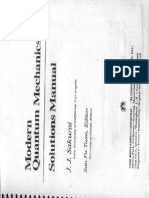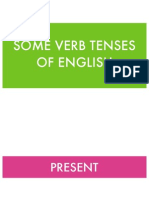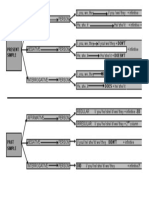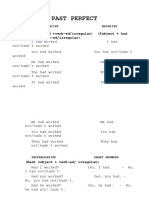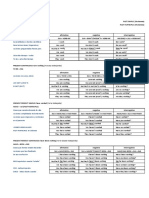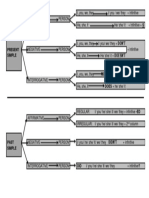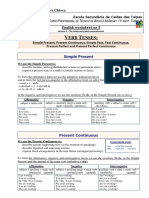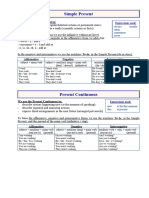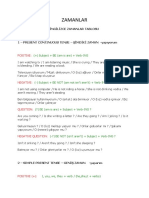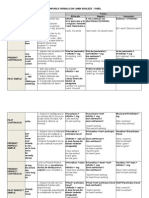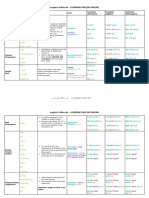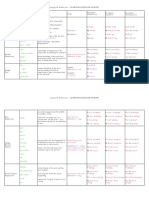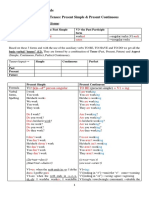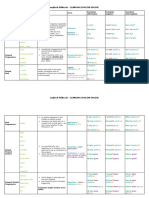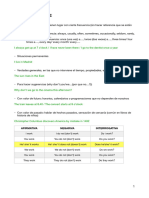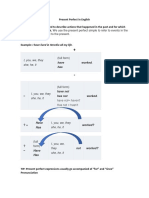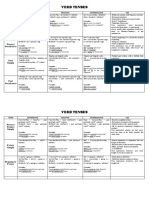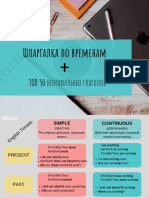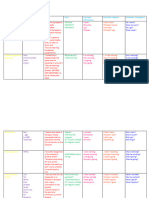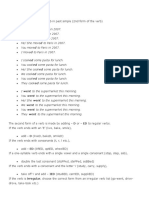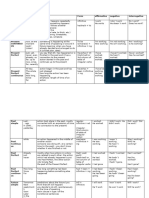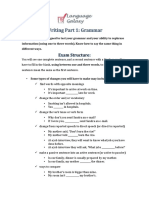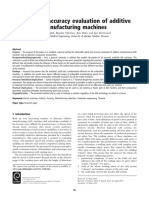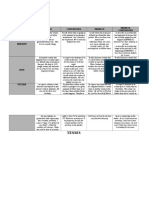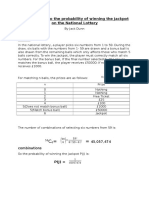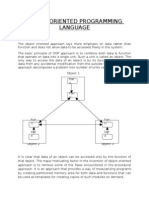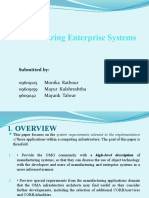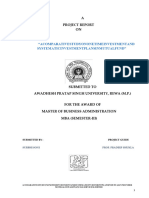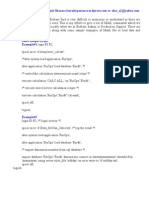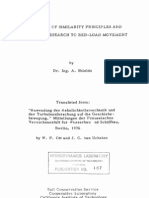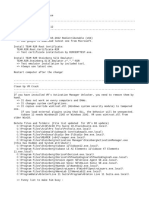0 ratings0% found this document useful (0 votes)
123 viewsThe Present Simple Tense: Did You Like Did He See
The Present Simple Tense: Did You Like Did He See
Uploaded by
Marko MillaThe document explains 8 English tenses: present simple, past simple, present continuous, present perfect, past continuous, present perfect continuous, past perfect, and past perfect continuous. For each tense, it provides the conjugations for the positive, interrogative, and negative forms for the first person singular and plural and third person singular subjects.
Copyright:
© All Rights Reserved
Available Formats
Download as DOC, PDF, TXT or read online from Scribd
The Present Simple Tense: Did You Like Did He See
The Present Simple Tense: Did You Like Did He See
Uploaded by
Marko Milla0 ratings0% found this document useful (0 votes)
123 views4 pagesThe document explains 8 English tenses: present simple, past simple, present continuous, present perfect, past continuous, present perfect continuous, past perfect, and past perfect continuous. For each tense, it provides the conjugations for the positive, interrogative, and negative forms for the first person singular and plural and third person singular subjects.
Original Description:
vremena
Original Title
vremena
Copyright
© © All Rights Reserved
Available Formats
DOC, PDF, TXT or read online from Scribd
Share this document
Did you find this document useful?
Is this content inappropriate?
The document explains 8 English tenses: present simple, past simple, present continuous, present perfect, past continuous, present perfect continuous, past perfect, and past perfect continuous. For each tense, it provides the conjugations for the positive, interrogative, and negative forms for the first person singular and plural and third person singular subjects.
Copyright:
© All Rights Reserved
Available Formats
Download as DOC, PDF, TXT or read online from Scribd
Download as doc, pdf, or txt
0 ratings0% found this document useful (0 votes)
123 views4 pagesThe Present Simple Tense: Did You Like Did He See
The Present Simple Tense: Did You Like Did He See
Uploaded by
Marko MillaThe document explains 8 English tenses: present simple, past simple, present continuous, present perfect, past continuous, present perfect continuous, past perfect, and past perfect continuous. For each tense, it provides the conjugations for the positive, interrogative, and negative forms for the first person singular and plural and third person singular subjects.
Copyright:
© All Rights Reserved
Available Formats
Download as DOC, PDF, TXT or read online from Scribd
Download as doc, pdf, or txt
You are on page 1of 4
THE PRESENT SIMPLE TENSE
I/ you / we / they he / she / it
+ know knows
? Do you know? Does he know?
I don’t know. She doesn’t know.
-
(don’t = do not) (doesn’t = does not)
THE PAST SIMPLE TENSE
Regular: infinitive + -ed, -d
Irregular: II column
I / you / he / she / it / we / they
liked (regular)
+ the film
saw (irregular)
Did you like
? the film?
Did he see
We didn’t like
- the film.
They did not see
THE PRESENT CONTINUOUS TENSE
To be + Present Participle (infinitive + -ing)
I you / we / they he / she / it
+ I’m going. You’re going. He’s going.
? Am I going? Are you going? Is he going?
- I’m not going. You aren’t going. He isn’t going.
THE PRESENT PERFECT TENSE
Have/has + Past Participle
PP of regular verbs: infinitive + -d, -ed
PP of irregular verbs: III column
I/ you / we / they he / she / it
have worked has worked
+
have seen has seen
Have you worked? Has he worked?
?
Have they seen? Has she seen?
I haven’t worked. He hasn’t worked.
-
We have not seen. She has not seen.
THE PAST CONTINUOUS TENSE
Was/were + Present Participle
I / he / she / it we / you / they
+ was working were working
? Was I working? Were you working?
- I wasn’t working. You weren’t working.
THE PRESENT PERFECT CONTINUOUS TENSE
Have/Has been + Present Participle
I/ you / we / they he / she / it
+ Have been working. Has been working.
? Have you been working? Has he been working?
- I haven’t been working. He hasn’t been working.
THE PAST PERFECT TENSE
Had + Past Participle
I / you / he / she / it / we / they
Had worked
+
Had seen
Had you worked?
?
Had he seen?
We hadn’t worked
-
They had not seen
THE PAST PERFECT CONTINUOUS
Had been + Present Participle
I / you / he / she / it / we / they
+ Had been working.
? Had you been working?
- We hadn’t been working.
You might also like
- ESL - English as a Second Language - Verbs: a QuickStudy Digital Reference GuideFrom EverandESL - English as a Second Language - Verbs: a QuickStudy Digital Reference GuideNo ratings yet
- Adjectives PDFDocument25 pagesAdjectives PDFNemrac NemracNo ratings yet
- Antennas For Multiple Spot Beam SatellitesDocument9 pagesAntennas For Multiple Spot Beam SatellitesTariqMahmoodNo ratings yet
- Modern Quantum Mechanics J.J Sakurai SolutionDocument130 pagesModern Quantum Mechanics J.J Sakurai Solutionferventlady100% (2)
- MGP01 Troubleshooting PDFDocument112 pagesMGP01 Troubleshooting PDFPedro MatosNo ratings yet
- The Present Simple Tense: Did You Like Did He SeeDocument4 pagesThe Present Simple Tense: Did You Like Did He SeeMarko MillaNo ratings yet
- Some Verb Tenses of EnglishDocument25 pagesSome Verb Tenses of Englishjurik_manNo ratings yet
- Past Simple and ContinuousDocument2 pagesPast Simple and ContinuousLaura Roman DelgadoNo ratings yet
- Present Simple: Affirmative Negative InterrogativeDocument3 pagesPresent Simple: Affirmative Negative InterrogativeAlejandra MalettiNo ratings yet
- How Often Something Happens: S S Es Don't Do DoesDocument3 pagesHow Often Something Happens: S S Es Don't Do DoesAndrei BulgaruNo ratings yet
- Past Simple Tense To BeDocument1 pagePast Simple Tense To BeMurgulet RoxanaNo ratings yet
- TensesDocument1 pageTensesBianka SeligaNo ratings yet
- Esquema TensesDocument2 pagesEsquema TensesMol UrbanoNo ratings yet
- Scoba TensesDocument1 pageScoba TensesNemrac NemracNo ratings yet
- Ta6. часів англ. м.Document2 pagesTa6. часів англ. м.b3tp121079No ratings yet
- Past Perfect EstructuraDocument3 pagesPast Perfect Estructuragarbinxuli9325No ratings yet
- PresentDocument27 pagesPresentJúlia TANo ratings yet
- Chart TENSESDocument2 pagesChart TENSESMurgulet RoxanaNo ratings yet
- Scoba TensesDocument1 pageScoba TensesNemrac NemracNo ratings yet
- Verb Tenses Chart - Paula 2018Document4 pagesVerb Tenses Chart - Paula 2018PauNo ratings yet
- TensesDocument19 pagesTensesAlina Elena Cioaca100% (1)
- Active N Passive Tenses - TableDocument3 pagesActive N Passive Tenses - TableRATINAMALA A/P KANAGA SUNDARAM -No ratings yet
- Simple Present: InglêsDocument5 pagesSimple Present: InglêsJuliaNo ratings yet
- The Present Perfect Continuous - Karen L. Hernández Chávez.Document5 pagesThe Present Perfect Continuous - Karen L. Hernández Chávez.Karen HernándezNo ratings yet
- I/ You/ We/ They Affirmative Person + infinitive-ING He/ She/ ItDocument1 pageI/ You/ We/ They Affirmative Person + infinitive-ING He/ She/ ItNemrac NemracNo ratings yet
- Recapitulare TimpuriDocument4 pagesRecapitulare TimpuriO. CatalinNo ratings yet
- TensesDocument5 pagesTensesNaNo ratings yet
- Englisch-Hilfen - de - LEARNING ENGLISH ONLINEDocument5 pagesEnglisch-Hilfen - de - LEARNING ENGLISH ONLINERedowan HossainNo ratings yet
- Tenses Table PDFDocument5 pagesTenses Table PDFAlejandra Neira GonzálezNo ratings yet
- İngilizce Zamanlar TablosuDocument3 pagesİngilizce Zamanlar Tablosufatih eroğluNo ratings yet
- Summary of Verb TensesDocument2 pagesSummary of Verb Tensesrs100% (1)
- Anglais - Precis de GrammaireDocument37 pagesAnglais - Precis de GrammaireBertrand GraffNo ratings yet
- WWW - Englisch-Hilfen - de en Grammar Tenses TableDocument5 pagesWWW - Englisch-Hilfen - de en Grammar Tenses TableBharath Reddy100% (2)
- Verbal Tenses Table 2 For l2Document3 pagesVerbal Tenses Table 2 For l2Andreea Bardas GlavanNo ratings yet
- Summary of Verb Tenses-NEWDocument3 pagesSummary of Verb Tenses-NEWsamirNo ratings yet
- Tenses TableDocument5 pagesTenses TableAlicia Rodríguez RomeroNo ratings yet
- #Tenses TableDocument5 pages#Tenses TabledanielitoNo ratings yet
- Englisch-Hilfen - de - LEARNING ENGLISH ONLINEDocument5 pagesEnglisch-Hilfen - de - LEARNING ENGLISH ONLINESuryaNo ratings yet
- Tenses (English) - Success DarpanDocument5 pagesTenses (English) - Success DarpanMOHD ZEESHANNo ratings yet
- Handout 1Document3 pagesHandout 1edenamiriambutNo ratings yet
- Englisch-Hilfen - de - LEARNING ENGLISH ONLINEDocument5 pagesEnglisch-Hilfen - de - LEARNING ENGLISH ONLINEMaria DuarteNo ratings yet
- TENSEs by SabinaaDocument5 pagesTENSEs by SabinaaSabina AmirNo ratings yet
- PRESENT SIMPLE and CONTINUOUS CHARTDocument2 pagesPRESENT SIMPLE and CONTINUOUS CHARTSusiNo ratings yet
- (Full Form) : I, You, We, They She, He, ItDocument33 pages(Full Form) : I, You, We, They She, He, ItSilvana NuñezNo ratings yet
- Advanced Class 7.1 - Present Perfect ContinuousDocument2 pagesAdvanced Class 7.1 - Present Perfect Continuousjejedivertida98No ratings yet
- Englisch-Hilfen - de - LEARNING ENGLISH ONLINEDocument5 pagesEnglisch-Hilfen - de - LEARNING ENGLISH ONLINEGipsy CamargoNo ratings yet
- İngi̇li̇zce Zamanlar TablosuDocument4 pagesİngi̇li̇zce Zamanlar TablosurealisemeNo ratings yet
- Presentes y Pasados Simple y ContinuoDocument11 pagesPresentes y Pasados Simple y ContinuoAida Álvarez LópezNo ratings yet
- Ale and Nela's First ClassDocument2 pagesAle and Nela's First ClassJeffry MirandaNo ratings yet
- Verb Tenses: Tense Affirmative Negative Interrogative USEDocument7 pagesVerb Tenses: Tense Affirmative Negative Interrogative USESanti Gual TenaNo ratings yet
- Tenses PDFDocument5 pagesTenses PDFAlina FrolovaNo ratings yet
- Tenses TableDocument6 pagesTenses TableKarin SasuNo ratings yet
- Tense Form VerbsDocument5 pagesTense Form VerbsLaura Malle LechugaNo ratings yet
- Simple Past TenseDocument4 pagesSimple Past TenseLaw Kai XinNo ratings yet
- TENSEs by SabinaDocument3 pagesTENSEs by SabinaSabina AmirNo ratings yet
- Serbian: Vocabulary Practice A1 to the Book “Idemo dalje 1” - Latin Script: Serbian ReaderFrom EverandSerbian: Vocabulary Practice A1 to the Book “Idemo dalje 1” - Latin Script: Serbian ReaderNo ratings yet
- Phil Clarke ICOMS 2000 PaperDocument12 pagesPhil Clarke ICOMS 2000 PaperMarko MillaNo ratings yet
- World Robotics 2012Document7 pagesWorld Robotics 2012Marko MillaNo ratings yet
- Confirmation of Entry and TimetableDocument1 pageConfirmation of Entry and TimetableMarko MillaNo ratings yet
- 3 MT German Language Builder Course PDFDocument40 pages3 MT German Language Builder Course PDFMarko MillaNo ratings yet
- Exercise 3 PDFDocument20 pagesExercise 3 PDFMarko MillaNo ratings yet
- Writing Part 1 WorksheetDocument7 pagesWriting Part 1 WorksheetMarko MillaNo ratings yet
- Conditionals - How To Translate ThemDocument2 pagesConditionals - How To Translate ThemMarko MillaNo ratings yet
- Speed and Accuracy Evaluation of Additive Manufacturing MachinesDocument12 pagesSpeed and Accuracy Evaluation of Additive Manufacturing MachinesMarko MillaNo ratings yet
- Table of English Tenses: Tense Affirmative/Negative/Question Use Signal WordsDocument4 pagesTable of English Tenses: Tense Affirmative/Negative/Question Use Signal WordsMarko MillaNo ratings yet
- Simple Continuous Perfect Perfect Continuous: Live in A Small VillageDocument3 pagesSimple Continuous Perfect Perfect Continuous: Live in A Small VillageMarko MillaNo ratings yet
- An Analysis Into The Probability of Winning The Jackpot On The National LotteryDocument5 pagesAn Analysis Into The Probability of Winning The Jackpot On The National LotteryAnonymous FkgVLmNo ratings yet
- ChartsDocument132 pagesChartsSarmad KfmNo ratings yet
- Selective Harmonic Elimination For A Single-Phase 13-Level TCHB Based Cascaded Multilevel Inverter Using FPGADocument10 pagesSelective Harmonic Elimination For A Single-Phase 13-Level TCHB Based Cascaded Multilevel Inverter Using FPGAsandeepbabu28No ratings yet
- Graphics ProgramDocument18 pagesGraphics ProgramSowmiyaNo ratings yet
- Pakistan Institute of Public Finance Accountants: Pipfa Syllabus 2019 Local Fund Audit Department PunjabDocument70 pagesPakistan Institute of Public Finance Accountants: Pipfa Syllabus 2019 Local Fund Audit Department PunjabMoazam KhanNo ratings yet
- Object Oriented Programming LanguageDocument16 pagesObject Oriented Programming Languagesunny8321No ratings yet
- English UEBM001901 PW200 PW220-7KDocument848 pagesEnglish UEBM001901 PW200 PW220-7KMichał BujaraNo ratings yet
- Manufacturing Enterprise Systems: Submitted byDocument28 pagesManufacturing Enterprise Systems: Submitted bysandyjbsNo ratings yet
- Surbhi Fin.Document27 pagesSurbhi Fin.Gopal KushwahaNo ratings yet
- Saudi Electricity Company: Eastern Region BranchDocument8 pagesSaudi Electricity Company: Eastern Region BranchmygoldieNo ratings yet
- Frictional ForceDocument6 pagesFrictional ForceSherilyn ApostolNo ratings yet
- TOPAS Technical ReferenceDocument267 pagesTOPAS Technical Referenceyixuerui84No ratings yet
- Nirvana 13 Discrete GDDR5 Schematics Document Sandy BridgeDocument104 pagesNirvana 13 Discrete GDDR5 Schematics Document Sandy BridgePhạm CườngNo ratings yet
- AMKASYN 028932 Ke KW Hardware Description en KE KES KENDocument230 pagesAMKASYN 028932 Ke KW Hardware Description en KE KES KENIsao TomitaNo ratings yet
- Brauduino Semi Automated Single Vessel RIMSDocument33 pagesBrauduino Semi Automated Single Vessel RIMSpferatoNo ratings yet
- MaxL ExamplesDocument4 pagesMaxL ExamplesAmit Sharma100% (1)
- Application of Similarity Principles and Turbulence Research To Bed-Load Movement - ShieldsDocument47 pagesApplication of Similarity Principles and Turbulence Research To Bed-Load Movement - ShieldsJedd FennerNo ratings yet
- Relational Querying: Relational Algebra Extensions and SQLDocument22 pagesRelational Querying: Relational Algebra Extensions and SQLAshim Mahat0% (1)
- How Many Eyeballs Tame ComplexityDocument2 pagesHow Many Eyeballs Tame ComplexityDana GarcésNo ratings yet
- R2RDocument2 pagesR2Rrangga.priambudiNo ratings yet
- Use of Protein TetsDocument5 pagesUse of Protein TetsNutsa ToduaNo ratings yet
- AlGaN GaN HEMTs-An Overview of Device Operation and ApplicationsDocument10 pagesAlGaN GaN HEMTs-An Overview of Device Operation and Applicationsarooshakya20No ratings yet
- Industry PPT SejalDocument11 pagesIndustry PPT Sejalsejalrayakwar147No ratings yet
- Unit2 Notes - QuaternionsDocument8 pagesUnit2 Notes - QuaternionsZNo ratings yet
- Automatic Teller Machine (ATM) & Cash Deposit Machine (CDM)Document32 pagesAutomatic Teller Machine (ATM) & Cash Deposit Machine (CDM)Kines KesavanNo ratings yet
- An Alternative To The Alcubierre Theory: Warp Fields by The Gravitation Via Accelerated Particles AssertionDocument20 pagesAn Alternative To The Alcubierre Theory: Warp Fields by The Gravitation Via Accelerated Particles Assertionroesch1986No ratings yet
- RatationDocument38 pagesRatationdrfefvdsfNo ratings yet



